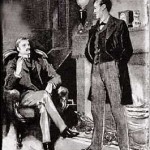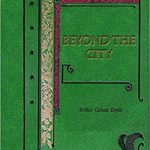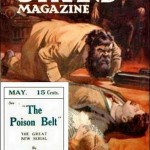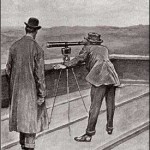“What’s not the matter with him. If he’s agrayable he’s not natural, and if he’s natural he’s not agrayable. I don’t pretind to be a saint. I’ve seen some fun in me day, and hope to see some more before I die; but there are some things that I wouldn’t do. If I live be cards it’s all fair and aboveboard. I never play anything but games o’ skill, and I reckon on me skill bringing me out on the right side, taking one night with another through the year. Again, at billiards I may not always play me best, but that’s gineralship. You don’t want a whole room to know to a point what your game is. I’m the last man to preach, but, bedad, I don’t like that chap, and I don’t like that handsome, brazen face of his. I’ve spint the greater part of my life reading folks’ faces, and never very far out either.”
Von Baumser made no remark, and the two continued to smoke silently, with an occasional pull at their flagons.
“Besides, it’s no good to me socially,” the major continued. “The fellow can’t keep quiet, else he might pass in a crowd; but that demned commercial instinct will show itself. If he went to heaven he’d start an agency for harps and crowns. Did I tell you what the Honourable Jack Gibbs said to me at the club? Ged, he let me have it straight! ‘Buck,’ he said, ‘I don’t mind you. You’re one o’ the right sort when all’s said and done, but if you ever inthroduce such a chap as that to me again, I’ll cut you as well as him for the future.’ I’d inthroduced them to put the young spalpeen in a good humour, for, being short, as ye know, I thought it might be necessary to negotiate a loan from him.”
“Vat did you say his name vas?” Von Baumser asked suddenly.
“Girdlestone.”
“Is his father a Kauffmann?”
“What the divil is a Kauffmann?” the major asked impatiently. “Is it a merchant you mean?”
“Ah, a merchant. One who trades with the Afrikaner?”
“The same.”
Von Baumser took a bulky pocket-book from his inside pocket, and scanned a long list of names therein. “Ah, it is the same,” he cried at last triumphantly, shutting up the book and replacing it. “Girdlestone & Co., African kauf—dat is, merchants—Fenchurch Street, City.”
“Those are they.”
“And you say dey are rich?”
“Yes.”
“Very rich?”
“Yes.”
The major began to think that his companion had been imbibing in his absence, for there was an unfathomable smile upon his face, and his red beard and towsy hair seemed to bristle from some internal excitement.
“Very rich! Ho, ho! Very rich!” he laughed. “I know dem; not as friends, Gott bewahre! but I know dem and their affairs.”
“What are you driving at? Let’s have it. Out with it, man.”
“I tell you,” said the German, suddenly becoming supernaturally solemn and sawing his hand up and down in the air to emphasize his remarks, “in tree or four months, or a year at the most, there vill be no firm of Girdlestone. They are rotten, useless—whoo! He blew an imaginary feather up into the air to demonstrate the extreme fragility of the house in question.
“You’re raving, Baumser,” said Major Clutterbuck excitedly. “Why, man, their names are above suspicion. They are looked upon as the soundest concern in the City.”
“Dat may be; dat may be,” the German answered stolidly. “Vat I know, I know, and vat I say I say.”
“And how d’ye know it? D’ye tell me that you know lore about it than the men on ‘Change and the firms that do business with them?”
“I know vat I know, and I say vat I say,” the other repeated. “Dat tobacco-man Burger is a rogue. Dere is five-and-thirty in the hundred of water in this canaster tobacco, and one must be for ever relighting.”
“And you won’t tell me where you heard this of the Girdlestones?”
“It vould be no good to you. It Is enough dat vat I say is certain. Let it suffice that dere are people vat are bound to tell other people all dat dey know about anything whatever.”
“You don’t make it over clear now,” the old soldier grumbled. “You mane that these secret societies and Socialists let each other know all that comes in their way and have their own means of getting information.”
“Dat may be, and dat may not be,” the German answered, in the same oracular voice. “I thought, in any case, my good friend Clutterbuck, dat I vould give you vat you call in English the straight tap. It is always vell to have the straight tap.”
“Thank ye, me boy,” the major said heartily. “If the firm’s in a bad way, either the youngster doesn’t know of it, or else he’s the most natural actor that ever lived. Be George! there’s the tay-bell; let’s get down before the bread and butther is all finished.”
Mrs. Robbins was in the habit of furnishing her lodgers with an evening meal at a small sum per head. There was only a certain amount of bread and butter supplied for this, however, and those who came late were likely to find an empty platter. The two Bohemians felt that the subject was too grave a one to trifle with, so they suspended their judgment upon the Girdlestones while they clattered down to the dining-room.





